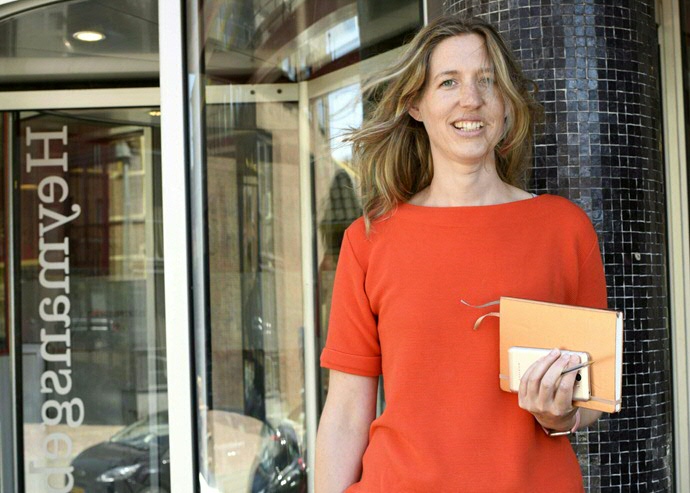Conducting research also benefits healthcare practice

Healthcare psychologist and cognitive behavioural therapist Klaske Glashouwer is a science-practitioner. At mental-health service provider Accare, she treats children and young people with eating disorders and coordinates research. At the Faculty of Behavioural and Social Sciences she researches the role of body image in anorexia nervosa. Linking research and practice is central to her work.
Very little serious research has been carried out into the causal role of a negative body image in anorexia nervosa, Klaske Glashouwer explains. ‘An extensive literature review found only 15 to 20 articles worldwide that really are really about the subject. There are all sorts of theories about it. But whether a negative or abnormal body image really is the driving force behind not eating? A great many people are unhappy with their bodies. Can anything be said about how a negative body image maintains the starvation? Or does avoiding food start off as rewarding behaviour and then become a habit? An addiction perhaps? Or does it stem from interpersonal relationships?’
Feeding knowledge
As a practitioner herself, Glashouwer is all too familiar with the lack of evidence that treatments actually work. It is, she says, extremely important for practitioners and researchers to work together closely to change this. ‘People with anorexia are a complex target group for research. They are relatively low in numbers. They are vulnerable. It is complicated to follow them for a longer period because there is always a high dropout rate in studies.’ She has been coordinating the research into eating disorders at Accare since 2012. ‘A number of people from our faculty work on eating disorders in both workplaces. Research is very important for practice. Healthcare is not static – it is constantly changing, and a lot is asked of practitioners. It is helpful if you can feed their knowledge and keep on top of developments in diagnosis and treatments.’
More than a laboratory
‘I have noticed,’ Glashouwer adds, ‘that by thinking about how we diagnose eating disorders, by providing training in that area and by involving the whole treatment team in research, we have given much better shape to our services at Accare. And it is equally important for the department at the University to have this connection. Not just as a kind of “laboratory” to research ideas and theories. Clinical studies also have more chance of success if you understand what you are asking of practitioners. And you can be hugely inspired by practice. If you know both worlds and respect each other you end up with 1+1=3.’
Back to the theory
There have been a number of excellent clinical trials of various treatments for anorexia nervosa in the world. ‘No one treatment works better than the others – that was the result. We therefore need to go back to the theory. Which processes maintain the disorder? Is it behavioural processes, biological reward processes, automatic processes...? That is what you need to find out from patients. For me this means finding out to what extent a better body image reduces the eating disorder. Can we develop a research model that will help us find this out from patients?’ She has a five-year plan for this. ‘I continue to be fascinated by the fact that the role of body image is not answered in scientific literature. Patients may well have a negative body image without there being a causal relationship.’ In a broader sense she thinks that the research world needs to discover which mechanism is most important.
Not just Eureka moments
Thanks to a VENI grant, Klaske now spends three days a week on her research. Step by step she is working on a model that will make it possible to research body image properly. The department where she works, Clinical Psychology and Experimental Psychopathology, is good at linking scientific research with the work of treatment teams, and this helps her. It is not just research results and publications that count. ‘Building relationships is valuable to both parties. It takes work, time and energy but is a good investment. Research is not just about Eureka moments – by conducting research you also benefit healthcare practice.’
Text: Angela Rijnen. This article has been taken from GMW Magazine.
More news
-
08 December 2025
Citizen participation essential for a sustainable energy future
-
23 October 2025
Nine UG researchers awarded Vidi grant
